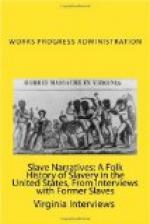Ex-slaves
interview with John Eubanks, ex-slave
John Eubanks, Gary’s only negro Civil War survivor has lived to see the ninety-eighth anniversary of his birth and despite his advanced age, recalls with surprising clarity many interesting and sad events of his boyhood days when a slave on the Everett plantation.
He was born in Glasgow, Barron County, Kentucky, June 6, 1839, one of seven children of a chattel of the Everett family.
The old man retains most of his faculties, but bears the mark of his extreme age in an obvious feebleness and failing sight and memory. He is physically large, says he once was a husky, weighing over two hundred pounds, bears no scars or deformities and despite the hardships and deprivations of his youth, presents a kindly and tolerant attitude.
“I remembah well, us young uns on the Everett plantation,” he relates, “I worked since I can remembah, hoein’, pickin’ cotton and othah chohs ’round the fahm. We didden have much clothes, nevah no undahweah, no shoes, old ovahalls and a tattahed shirt, wintah and summah. Come de wintah, it be so cold mah feet weah plumb numb mos’ o’ de time and manya time—when we git a chanct—we druve the hogs from outin the bogs an’ put ouah feet in the wahmed wet mud. They was cracked and the skin on the bottoms and in de toes weah cracked and bleedin’ mos’ o’ time, wit bloody scabs but de summah healed them agin.”
“Does yohall remembah, Granpap,” his daughter prompted, “Yoh mahstah—did he treat you mean?”
“No,” his tolerant acceptance apparent in his answer, “it weah done thataway. Slaves weah whipt and punished and the younguns belonged to the mahstah to work foah him oh to sell. When I weah ’bout six yeahs old, Mahstah Everett give me to Tony Eubanks as a weddin’ present when he married mahstah’s daughtah Becky. Becky would’n let Tony whip her slaves who came from her fathah’s plantation. ‘They ah my prophty,’ she say, ‘an’ you caint whip dem.’ Tony whipt his othah slaves but not Becky’s.”
“I remembah” he continued, “how they tied de slave ’round a post, wit hands tied togedder ’round the post, then a husky lash his back wid a snakeskin lash ’til hisn back were cut and bloodened, the blood spattered” gesticulating with his unusually large hands, “an’ hisn back all cut up. Den they’d pouh salt watah on hem. Dat dry and hahden and stick to hem. He nevah take it off ’till it heal. Sometimes I see marhstah Everett hang a slave tip-toe. He tie him up so he stan’ tip-toe an’ leave him thataway.
“I be twenty-one wehn wah broke out. Mahstah Eubanks say to me, ’Yohall don’ need to run ‘way ifn yohall want to jine up wid de ahmy.’ He say, ‘Deh would be a fine effin slaves run off. Yohall don’ haf to run off, go right on and I do not pay dat fine.’ He say, ’’nlist in de ahmy but don’ run off.’ Now I walk thirty-five mile from Glasgow to Bowling Green




